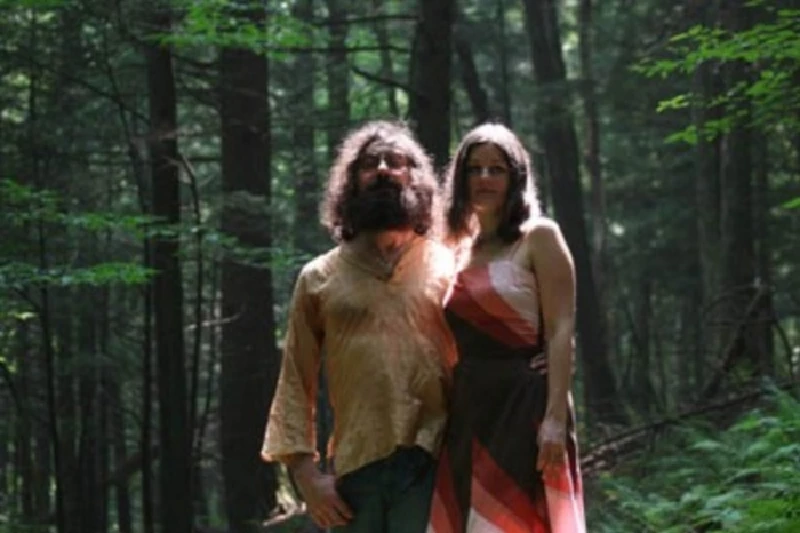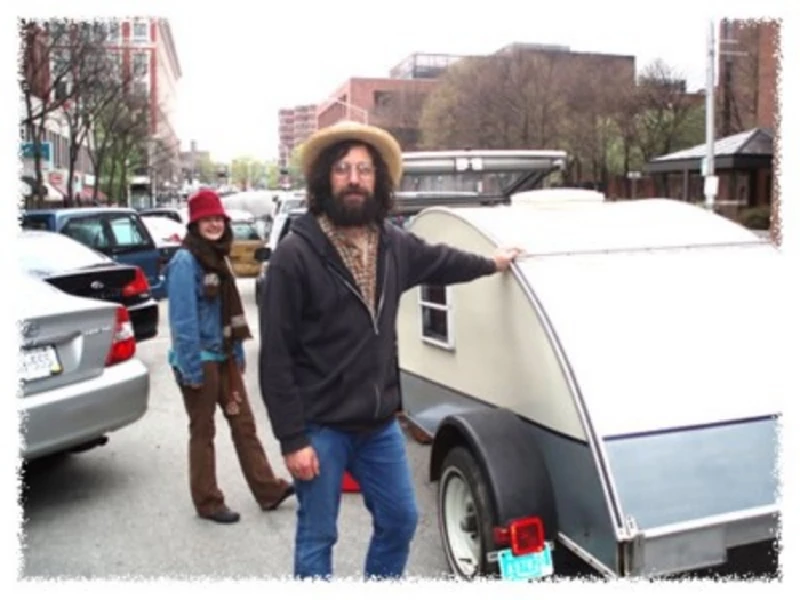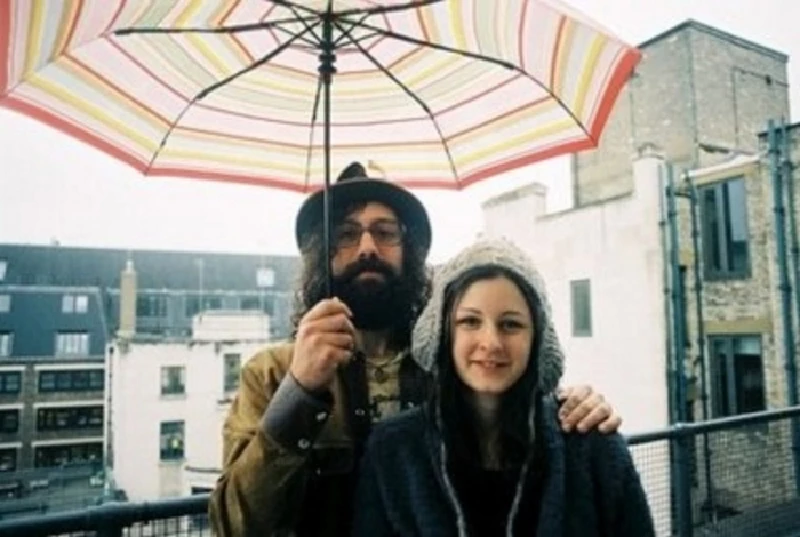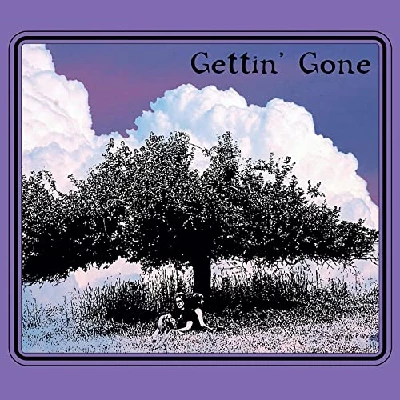MV & EE with the Golden Road - Interview
by Dominic B. Simpson
published: 22 / 3 / 2008

intro
At a concert at the Luminaire in London, Dominic Simpson speaks to Matt Valentine, one half of psychedelic folk duo MV & EE, about his group's three albums and many other unoffical albums, and his decision to relocate it from New York to Vermont
I’m in the backroom of the Luminaire, a sumptuous if small venue in Kilburn, with Matt Valentine, one half of the duo MV & EE (also known as MV & EE with the Bummer Road and MV & EE with the Golden Road). The EE stands for his partner Erika Elder, with whom he has mined some awesome rural “lunar blues”, as they’ve described it themselves, for the past decade or so, fusing raga workouts, astral blues, psychedelic rock, Appalachian folk, and wig-out experimentalism. Over the course of three official albums - 'Mother of Thousands', 'Green Blues' and 'Gettin’ Gone' - and aided by the likes of Dinosaur Jr’s J. Mascis among other guests, they’ve synthesised all these elements into a whole, slowly inching towards coherent song structures on each subsequent release. Like other artists orbiting the same aesthetic, though, MV & EE’s music is often challenging, difficult material to accept. And, as with other similar artists, the duo share a dedication to spawning many unofficial releases, including numerous CD-R’s and the utilising of that forgotten format: tapes. Later on tonight, enhanced by a full band that includes Samara Lubelski on bass, Tim Barnes on drums, and Doc Dunn on pedal steel, the band will go on to play a beautifully stoned set of space blues, climaxing with a glorious ten-minute plus jam of 'Canned Happiness' from 'Green Blues'. It’s line “you can’t pay the rent / with happiness / you can’t pay the rent / with love” shatters any notion that the duo are living in a paradise free from the concerns that the rest of us have to face in our daily lives; nonetheless, there is something strange and other-worldly about MV & EE’s music, as if this is music beamed down by aliens from another constellation. It certainly feels like that on their truly out-there, rambling, epic take on the old blues lament ‘Death Don’t Have No Mercy’. But more on that later. Sitting with a beer and stroking his luxurious beard, Valentine begins the interview by contemplating, “I tend to look at those three albums as a trilogy - 'Mother of Thousands' being the first, obviously, and I think 'Gettin’ Gone' kind of sums up the song forms in a maybe slightly more ergonomic fashion. But it also has progressed in terms of like our ability to kind of get the message across a little more directly on those records. So I think depending on what your tastes are, you know there’s a little bit of the [feel of the early] CD-Rs, but I think they’ll be quite a change in direction on 'Gettin’ Gone'.” The couple began making music in the 90’s while living in Manhattan, at a time when the area was still affordable and subject to rent laws. Valentine and Elder immersed themselves in the cities’ psych-rock and folk scene that has taken fruition today, with similar cosmic freak-out heads like Espers, Bardo Pond, and Sunburned Hand of the Man mining similar material. It is here that MV & EE were part of the Tower Recordings Band, a collective of weirdoes and stoners which included names like Spanish Wolfman and P.G. Six. In his rambling, digressing narrative, Valentine recalls: “We were playing kind of free folk, and more psychedelic folk, way before the other stuff; this was when grunge was happening…. Everyone was kinda like…just, grew into their own thing, or fell of the tree and became something else. Kind of grew to help nurture another aspect of life." The band has since left Manhatten, the borough far too expensive to accommodate the kind of wayward music that MV & EE do. They’ve since set up shop in the state of Vermont, near the town of Brattleboro. “I don’t live in Brattleboro – that’s the nearest metropolis to us. It’s about twelve thousand people. We live in a little community farm called Guildford,” Valentine clarifies. “It was just time for me, I’d been there [NYC] for a while and Erika and me wanted to spend a little more time kind of being in tune with nature, it helps us hear the intervals better.” What made you decide to leave New York City – was it the prices? Valentine shrugs: “It was just time for me, I’d been there for a while and Erika and me wanted to spend a little more time kind of being in tune with nature. It helps us hear the intervals better.” Do you think it’s affected the sound now that you’ve moved from NYC? “Definitely. It’s a lot more open space, I think…in the music now that’s a direct result of being in the country. And there’s a lot more of a colloquial way of – for lack of a better word – harvesting our music being there, because we’re not so tied down with spatial problems. So things like that…” So were you actually in Manhattan itself, rather than Brooklyn (where a lot of NYC’s interesting and ‘out-there’ music appears to be coming from these days?) “We were in New York City proper”, he confirms. “We actually got our flat from a dude who plays with Hazel Atkins – he was a steel guitar player with him, and he kind of passed it down to us. He’d been there in the late 70’s to early 80’s, and that gave us a kind of…not a grandfather clause, but it was still pre-rent control laws changing, so we were able to sustain ourselves there without a huge headache…we were on 4th Street – we actually lived in an appartment next to Ikue Morie [from DNA]. DNA and Mars used to rehearse in the loft across the street.” These kinds of bands, synonymous with the so-called ‘No Wave’ scene of the early 70’s, represented another New York City: the anarchic, experimental and innovative Lower East Side scene that attracted so many weirdos, musicians and filmmakers. With its cheap rents and large, easily available downtown living spaces, late 1970’s bankrupt Manhattan represented a place where creative minds could expand on their art, uninhibited by financial or work pressures. Those days have long gone now, replaced by an endless parade of bars and boutiques, and exorbitant living rents. In this climate, it’s no surprise that left-field, often experimental music of the kind that MV & EE perform was going to find it tough. The idea of any No Wave musician living in Manhattan now is a rather anachronistic one, given how much that scene was part of its environment at the time – a bankrupt, dystopian city teetering on the edge of crime and anarchy. There are other examples of more challenging music finding it difficult in such an environment. The similarly wayward-inclined No Neck Blues Band, a mysterious collective with their strange ‘jugband’ blues (for want of a better description), previously were based in Harlem, but according to Valentine “they lost that space. They had a cool scene going there for a while…a couple of those cats moved upstate also. They moved to the Delaware Water Gap area of New York, which is this weird part of the Hudson Valley, where I’m from.” There’s a parallel in London, of course, with the closure of venues like the Spitz (where Pennyblackmusic used to host nights), Turnmills and the Hammersmith Palais, all venues where music struggles in the face of commercialism and rampant capitalism. These places have been replaced by either bistros catering for financial stockbrokers or, worse still, sanitised office blocks. Any trace of challenging music has been erased. “No, it’s difficult”, Valentine agrees. “That’s why there’s such an exodus to Brooklyn and so forth. Erika’s from the country and we just kind of figured, ‘well, let’s just go as far out as possible’ - we’re kind of into extremes, so getting out that far helped us to expand on the concepts of our cottage label, Child of Microtones. And it also brought more like-minded players a bit more directly; like, people who could dig that scene we kind of found would come and visit us, and that made it a lot easier to play music. And I think that’s a lot of what 'Gettin’ Gone' is about as a record – you know, at first it’s a little deceiving to a lot of people, but it’s one of those records that I think for us is our grand statement of a certain era of music.I mean, I tend to go for more left-field sounds myself…” Which leads to the question of Valentine’s influences. The extraordinary closing track of 'Mother of Thousands' is a twenty-four minute take on the traditional American folk classic ‘Death Don’t Have No Mercy’ that bridges the gap between the obscure roots in folk that the music’s motifs are based around and the Grateful Dead in their prime, right through to the likes of Bardo Pond and Jackie O------------- today. Elder’s serene, ghostly voice on the track sounds beamed down from a far away galaxy, while haunting noises hover in and out of the mix. The effect is more like a disorienting bad trip rather than any jolly knees-up folk music. At the other end of the extreme, 'The Burden from Gettin’ Gone' is a gorgeous, desolate piece of Americana, with its deft slide work and lullaby harmony. MV & EE’s music is like a quilt patchwork of different strands of American musical idioms. Are folk and blues the primary influences in their music mainly blues and folk? “Yeah, for sure”, he nods. “I mean, just in terms of playing, we like sitting around…we don’t have a TV at the house so yeah, we just spend a lot of time just sitting around playing tunes, teaching each other different songs…so that kind of thing comes out paramount in the music. And then of course there’s the rock - we like noise...we dig it and we pick up on that.” What about more extreme elements like Wolf Eyes and Japanese power electronics nutter Merzbow, whose influence is less apparent? “I love Wolf Eyes. You know, I don’t really like their more aggressive, more dumbed-down side, like how they attract sort of a ned element…I don’t really dig that, but I like their more intellectual approach to noise music…I think it’s pretty exemplary…[and] yeah, I dig Merzbow. My thing with that goes more into, like, Ilhan Mimaroglu [obscure Turkish electronic musician], like more guys from the 70's that I think use concepts that Merzbow uses. I like Keiji Haino a lot – I like Haino more for me just because he’s a guitar player; you know, more of a kind of a folk enthusiast too. And Ghost are brilliant, man. I think one of the greatest Japanese guitar players is Kurihara. I think he’s brilliant.” Is there any influence from folk that comes from outside the US, such as the British type? “I like Fairport Convention. I tend to go pretty deep with the British folkies – my favourite is Ian A. Anderson. He’s my favourite; he ran a label called Village Thing Records in the early 70’s, which was a very beautifully forward-thinking home for a lot of more leftfield and free-thinking folk artists. So Ian A. Anderson’s probably one of my favourites next to the greats like David Graham, Richard Thompson etc. All those guys are great but Ian Anderson is a bit more underground than those cats. He also put out records by Wizz Jones, who is also a hero – a great British folk guitar player from the first wave equal to Davy Graham. I played a show with Wizz around the time of our first album – he came onstage, and I met him. I’m still searching for him…when Wizz came over it was great to see him play, seeing this guy very much making his statement, and he’s still making that same statement…” Valentine’s eyes glaze over. Was that when you were still living in NYC? “It was. That was a show in NYC. There was a series [of gigs]…we did a show with him, Sandy Bull…” Valentine recalls, “I was a big fan of Sandy Bull and [John] Fahey at that time…we played with Fahey.” The pioneering instrumental American guitarist remains an enormously important influence on the current alternative music scene right up to his death in 2002, with his influence found in everyone from MV & EE themselves, Six Organs of Admittance, Cul de Sac and so many others; on this side of the pond, the influence can be heard in the likes of James Blackshaw, Voice of the Seven Woods, etc. “Yeah, Fahey’s brilliant. That [Fahey’s death] was a big loss for me. You know, with guys like him and Basho…a lot of that stuff - it was a lot more underground than now.” This period also saw the likes of Tom and Christina Carter’s Charalambides down in Texas honing a similar craft, away from the gaze of the media. Slowly, different strands of what 'The Wire' would rather dubiously dub ‘ New Weird America’ appeared in outposts around the country. The All Tomorrow’s Parties festival that Thurston Moore curated in 2006 represented a kind of coming together of all these bands; a gathering of the clans, if you like. It was an unforgettable experience for this journalist. Of Charalambides, Valentine ponders, “yeah, Tom was doing it about the same time as we were – you know, he had his Wholly Other imprint, and there weren’t that many people doing that sort of sound”. Since then, with the bewitching likes of Espers, Joanna Newsom and Devandra Barnhart achieving some fame, the media has took some notice, leading to a label that Valentine is rightly weary of, that of ‘freak-folk’. Of these artists, he muses, “Well you know, age is what it is, I mean it’s the great equaliser. I think the difference now is that you have a whole different thing around these new artists that are taking a little closer to public awareness, and it’s beautiful that cats like Devendra Barnhart are able to bring this sort of style...he’s certainly developed and he’s quite a talent – great, great player, and we played some shows [together] early on. You can see him shining then and it’s beautiful to see that happen”. He pauses. “I don’t know if he’s completely honed his craft yet…I think when we were doing it, we had the luxury of being left alone when we were doing experimental folk. So it was a lot easier to kind of develop that, and we had a residency while we were in New York. We still do one regularly up in the country where we are now, where we have these shows in these arts spaces…” Is that in Brattleboro? “Yeah, that’s in Brattleboro where we do these things. It’s in a place called the Tinderbox, which is a pretty hip scene.” Valentine ponders the band’s context in the kind of scene that Barnhart has popularised, with the duo’s transition from their hazy days in the The Tower Recordings Band to their present moniker MV & EE, signed to a more prominent record label. “The Tower [Recordings Band] thing to us – now we all just got off on a different tangent, and you know, eventually we just ended up getting signed to the label Ecstatic Peace. And Thurston Moore used to come to a lot of our early shows with Tower and he also came to a lot of shows that I did solo and that Erika and I did as a duo…because we sort of started as a duo, you know…and we had guests and transits and things and like-minded spirits…eventually, we realised that what we’re doing now is kind of – you know, we’re always kind of moving forward with it, so we kind of feel that the folk thing…that to us is already like almost thirteen or fourteen years gone now. So, for us – in a way, when Erika and I did the free folk festival in Brattleboro, and then all of a sudden that term got kind of bastardised by the media into ‘freak folk’ - we only meant it as kind of free-thinking people”. Like in the same way that people say ‘free rock’?… “Exactly, or ‘free jazz.’ It was just like more like a lifestyle, and like a way of living and appreciating music’s. And other things… there’s no baggage with it. It was more of a DIY and sharing of ideals and things”. Indeed, despite their higher profile and residency on a larger label, MV & EE still share enthusiasm for maintaining the DIY approach, an aesthetic shared with the likes of Sunburned Hand of the Man and others, bands who emphasise a grassroots, hands-on dedication to dealing with gigs and releases. Valentine enthuses, “We’re kind of into checking out what’s happening. Like our latest releases, man, are three seven-inch singles post 'Gettin’ Gone' all on bedroom labels, and two cassettes. That’s what we’ve got happening.” It’s this dedication to keeping things fresh and innovative that ensures MV & EE will never be sucked into the mainstream. Their championing of the DIY cause is reflected in their music too. Valentine contemplates, “I mean, our arts are definitely in this subterranean music, so you know for us, when things get a little too…you don’t wanna get ever too comfortable with what it is you’re doing. And that’s sort of like our thing – we’re always constantly challenging ourselves, trying to up the ante for ourselves, just to keep inspired. Because once you get a little settled into it, it’s over – that’s where you see…the media even notice it. For whatever the media is – and I’m not really too big on the science of criticism – somehow it always ends up being relatively in tune with a face…if you mapped it out…” He searches for the right phrase. “The artists are kind of stalling, just kind of hovering.” Is the left-field scene that MV & EE move in a more convivial place between bands than in the ‘mainstream’ (whatever the mainstream is these days)? “I would think so”, he muses. “That’s how we like to see it – we’re not really into the negative side of it. It’s like that Hunter S Thompson quote: ‘the music business is a cruel and shallow money trench…there’s also the negative side’”. Are you involved in any other projects besides MV & EE? “No, this is the main thing I’m doing.” He ponders. “This is it – it’s my big project…I guess we do have one side-project called College Girls Gone Wild but I forget about that one…we’re not that active…that’s a cool combo, which is Erika and I with Paul Flaherty [saxophonist], Thurston Moore…Chris Corsano moonlights in that band as well…he’s on our new tour disc. And Mick Flower [from Vibracathedral Orchestra] is joining with us for the rest of the tour on bass”. Corsano’s wild-fire, free-form drumming has been heard on Sunburned’s endless spew of releases and live manifestations, as well as on his collaboration with Flaherty on the frequently atonal free-jazz opus 'The Hated Music'. This kind of company ensures that MV & EE are never likely to threaten the Billboard Top 100. The music they make and their network of musicians is established firmly in the left-field fringe. Valentine looks dazed as the interview finishes. I ask him how long the tour has left. “We have about ten days left. It’s about a five week tour”, he remembers. “When we get back we’re going to finish up a record. You know, we’ll finish that up and then hopefully we’ll come back in May and do a few festivals in Europe. And then we’ll tour the States in June. Terrascope’s around then, in Kentucky.” It doesn’t look like the duo has any plans to stop soon. And judging from the fireworks on display tonight, they have plenty of years to come plying their trade yet. Just before returning to his partner in the main part of the venue, facing a stage with the various support bands soundchecking, Valentine shakes my hand convivially as the interview ends. We put our bottles of beer down and contemplate the evening ahead.
Picture Gallery:-


reviews |
|
Gettin' Gone (2007) |

|
| Hit and miss Neil Young-inspired latest outing from art-damaged New York weird-folk duo MV & EE. |
most viewed articles
current edition
Carl Ewens - David Bowie 1964 to 1982 On Track: Every Album, Every SongArmory Show - Interview with Richard Jobson
John McKay - Interview
Colin Blunstone - Thalia Hall, Chicago, 16/7/2025
Billie Eilish - O2 Arena, London, 10/7/2025
Bathers - Photoscapes 1
Visor Fest - Valencia, Spain, 26/9/2025...27/9/2025
Loft - Interview
Sir Tim Rice - Interview
Robert Forster - Interview
previous editions
Manic Street Preachers - (Gig of a Lifetime) Millennium Stadium, Cardiff, December 1999Heavenly - P.U.N.K. Girl EP
Beautiful South - Ten Songs That Made Me Love...
Boomtown Rats - Ten Songs That Made Me Love....
Peter Perrett - In Dreams Begin Responsibilities Interview Part One
Oasis - Oasis, Earl's Court, London, 1995
Trudie Myerscough-Harris - Interview
Coldplay - Wembley Arena. London, 16/8/2022
Prolapse - Interview
Pixies - Ten Songs That Made Me Love...
most viewed reviews
current edition
Davey Woodward - Mumbo in the JumboSick Man of Europe - The Sick Man of Europe
Lucy Spraggan - Other Sides of the Moon
Suzanne Vega - Flying With Angels
Amy Macdonald - Is This What You've Been Waiting For?
Phew, Erika Kobayashi,, Dieter Moebius - Radium Girls
Blueboy - 2
Bush - I Beat Loneliness
Alice Cooper - The Revenge of Alice Cooper
Cynthia Erivo - I Forgive You
Pennyblackmusic Regular Contributors
Adrian Janes
Amanda J. Window
Andrew Twambley
Anthony Dhanendran
Benjamin Howarth
Cila Warncke
Daniel Cressey
Darren Aston
Dastardly
Dave Goodwin
Denzil Watson
Dominic B. Simpson
Eoghan Lyng
Fiona Hutchings
Harry Sherriff
Helen Tipping
Jamie Rowland
John Clarkson
Julie Cruickshank
Kimberly Bright
Lisa Torem
Maarten Schiethart